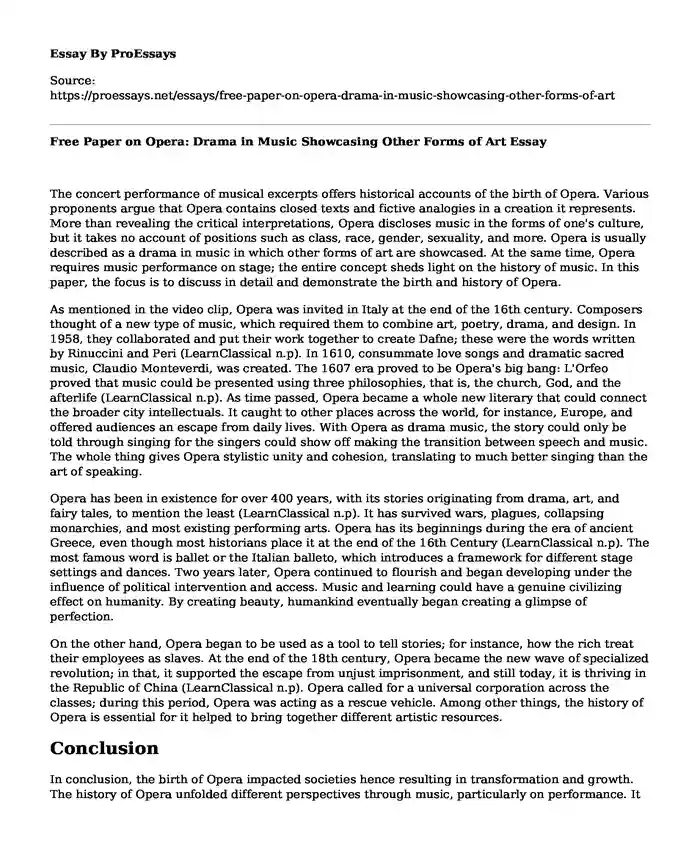The concert performance of musical excerpts offers historical accounts of the birth of Opera. Various proponents argue that Opera contains closed texts and fictive analogies in a creation it represents. More than revealing the critical interpretations, Opera discloses music in the forms of one's culture, but it takes no account of positions such as class, race, gender, sexuality, and more. Opera is usually described as a drama in music in which other forms of art are showcased. At the same time, Opera requires music performance on stage; the entire concept sheds light on the history of music. In this paper, the focus is to discuss in detail and demonstrate the birth and history of Opera.
As mentioned in the video clip, Opera was invited in Italy at the end of the 16th century. Composers thought of a new type of music, which required them to combine art, poetry, drama, and design. In 1958, they collaborated and put their work together to create Dafne; these were the words written by Rinuccini and Peri (LearnClassical n.p). In 1610, consummate love songs and dramatic sacred music, Claudio Monteverdi, was created. The 1607 era proved to be Opera's big bang: L'Orfeo proved that music could be presented using three philosophies, that is, the church, God, and the afterlife (LearnClassical n.p). As time passed, Opera became a whole new literary that could connect the broader city intellectuals. It caught to other places across the world, for instance, Europe, and offered audiences an escape from daily lives. With Opera as drama music, the story could only be told through singing for the singers could show off making the transition between speech and music. The whole thing gives Opera stylistic unity and cohesion, translating to much better singing than the art of speaking.
Opera has been in existence for over 400 years, with its stories originating from drama, art, and fairy tales, to mention the least (LearnClassical n.p). It has survived wars, plagues, collapsing monarchies, and most existing performing arts. Opera has its beginnings during the era of ancient Greece, even though most historians place it at the end of the 16th Century (LearnClassical n.p). The most famous word is ballet or the Italian balleto, which introduces a framework for different stage settings and dances. Two years later, Opera continued to flourish and began developing under the influence of political intervention and access. Music and learning could have a genuine civilizing effect on humanity. By creating beauty, humankind eventually began creating a glimpse of perfection.
On the other hand, Opera began to be used as a tool to tell stories; for instance, how the rich treat their employees as slaves. At the end of the 18th century, Opera became the new wave of specialized revolution; in that, it supported the escape from unjust imprisonment, and still today, it is thriving in the Republic of China (LearnClassical n.p). Opera called for a universal corporation across the classes; during this period, Opera was acting as a rescue vehicle. Among other things, the history of Opera is essential for it helped to bring together different artistic resources.
Conclusion
In conclusion, the birth of Opera impacted societies hence resulting in transformation and growth. The history of Opera unfolded different perspectives through music, particularly on performance. It helped delight audiences of all ages and cultures from the recent past till in contemporary times.
Work Cited
LearnClassical. "Howard Goodall Big Bangs 3 Opera." YouTube, www.youtube.com/watch?v=YECRoWklQSo&t=424s.
Cite this page
Free Paper on Opera: Drama in Music Showcasing Other Forms of Art. (2023, Nov 03). Retrieved from https://proessays.net/essays/free-paper-on-opera-drama-in-music-showcasing-other-forms-of-art
If you are the original author of this essay and no longer wish to have it published on the ProEssays website, please click below to request its removal:
- The Shape of Water - Film Analysis Essay
- Hero's Journey Analysis Based on the Movie "Mulan" - Paper Example
- Analysis of Songs Lyrics Paper Example
- Documentary Analysis Essay on Ellis Island
- Essay Sample on Similarities and Differences Between "The Bluest Eye" and "Eve's Bayou"
- Developing Effective Social Media Strategies - Essay Sample
- Essay Sample on Best Family Movies: The Simpsons, Family Guy, & American Dad







